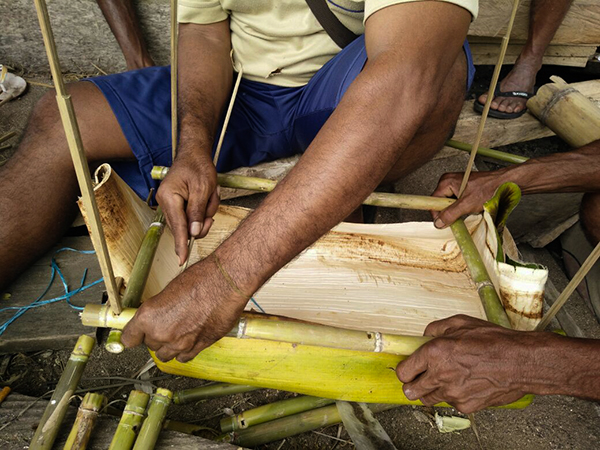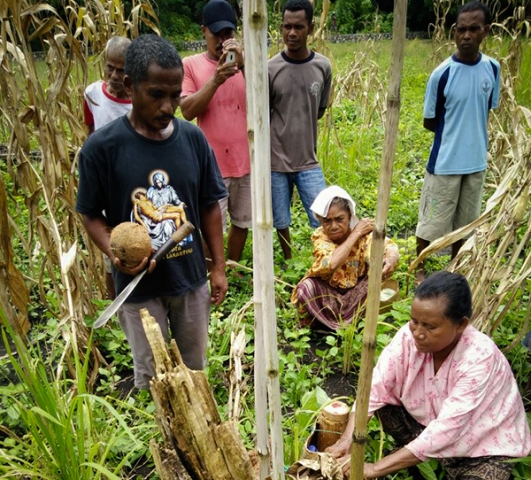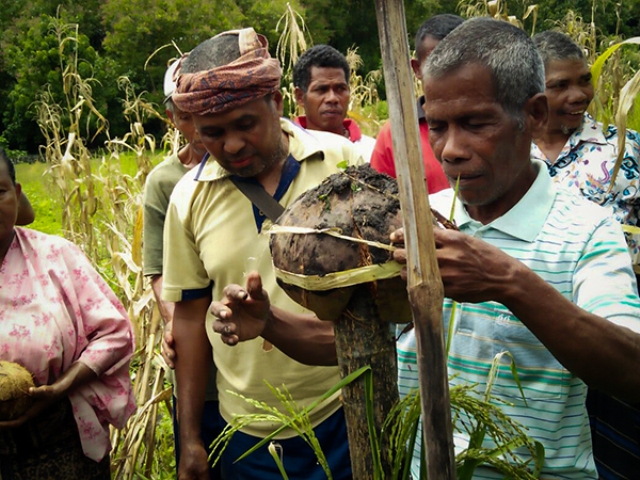Ende, Vox NTT–Tanah Detunggali is communion land or in Lio custom language often called “Tana Nggoro“. This communal land occupies several villages incorporated in the administrative area of Wewaria sub-district, Maurole sub-district and Detukeli sub-district.
Indigenous peoples in “Tana Nggoro” is very strong with cultural traditions. They believe that the ancestral traditions inherited by their ancestors became a foothold to save their crops.
It is Yohanes Wangge, Mosalaki Gao Wisu said that the traditional ritual stage “Tana Nggoro” is still being carried out. The tradition is a public obligation to celebrate indeed.
The same thing is said by David Mboi, son of Mosalaki Pu’u who is the brother of Yohanes Wangge. According to David, there are four stages of custom procession that must be done by all components including ana kalo fai walu.
Each of the ritual phases has different ordinances. Of course, they are under the control of the Mosalaki or the custom Elder. The following ritual stage of expelling pests;
Pire Te’u
Pire Te’u ceremony is usually done after the Nggua Ria ceremony or big customs. The customary elder or Mosalaki announces to the farmer or ana kalo fai walu to collect all kinds of food for the purposes during the pire te’u ceremony.
At that time, in the indigenous village or Lewumbangga, Mosalaki’s children distributed some grains of rice with kitchen ash and chicken feathers all filled in a container called Ke’a eyes. This procession means that all ugliness from inside the house is sneaked through the container.

The sign of silence will soon begin through the beating of gongs by traditional elders. All the children of Tana Nggoro village are obliged not to make a commotion and in dark condition without any light until the appointed time.
If the ban is not honored by the farmer then will be penalized in the form of a pig called Poi. The sanctions will be delivered by Mosalaki’s son the next day.
The atmosphere of silence lasted for approximately three to four hours marked by announcements by Mosalaki in a traditional language called Bhora. Farmer activities can be done as usual.
Until the next day, the ke’a mata container was thrown into the yard of the house while shouting marked all the pests away from the plant. Subsequently, the container was burned in traditional house.
This pire te’u procession lasts for one week. And in those days, all agricultural activities including the execution of any project were suspended. That is, this procession period to repel pests especially rats (Te’u) so as not to attack farming cultivators.
Sewu Api
After the custom procession of Pire Te’u followed the Sewu Api customary ritual which lasted one to two weeks later. This ritual is marked by messengers of ana kalo fai walu to catch aquatic animals such as shrimp, crabs to eels. The catch will be brought to the custom house for cooking in the evening.
After all was cooked, Mosalaki began to make a bonfire with a log fire prepared by the tillers the day before. Until the remaining embers, Mosalaki then performed ritual feeding to the ancestors, tana watu and tubu kanga.

Furthermore, eating together with ana kalo fai walu who signed and agreed not to burn garbage outside the house, hanging gebang, palm leaves, pandan leaves and other materials which is often used to make bakul and sokal or Lio language mentions mbola no’o lepo.
The meaning of this customary procession or ritual is that the cultivated fields of cultivation grow fertile and are not attacked by pests. In the local customary language is called “Tedo tembu wesa wela, meta ngere lelu kela, mbombe ngere bhoka rose, lisa ngere gai ria”.
Wira Bara
The ritual of wira bara will begin immediately after the customary procession of Sewu Api. Custom procession is done as a sign of the tenants or ana kalo fai walu to be allowed to burn the garbage, drying lontar and so to make mbola no’o lepo.
This ritual often coincides when the rice fields or Pare uma wolo have secreted the grain or in the local language called pare nebu soke bode.
Ana kalo fai walu can replant the remaining rice which is planted at the beginning of the planting season or the local language is called peso tedo tera are.
Joka Ule
This procession is done in order to reject or expel all pests of disease that attack the plants to return to their original place of origin. Some types of pests referred to such as, caterpillars, puppets, grasshoppers, ants and other pests.
This ritual procession in Tanah Detunggali is usually performed simultaneously with a procession of wira bara.
Previously, this activity is marked by making a small boat made of mayang pinang midriff, gelagah stem, bamboo, rope and gebang and then after all it is similar to sailboats.
All of the above mentioned pests are inserted into boats which are saturated through swift water by first providing food or offerings.
The customary elders or Mosalaki while reciting the adat phrase as meaning to reject or expel all kind of pest. The following is his customary language quotes;
“Kami joka wola sumba walo sa lei sawe eo re’e, kengo, ko’a, ule, metu, nggoka. Mbana sai sa’o beu lora bewa sai, lau leka nggoka eo joga goma, leka ndere eo mer mele”.
The boat raiding ceremony is finished, all the farmers or ana kalo fai walu with mosalaki back to traditional house to eat together. Usually, this is followed by custom orders or custom stories and adat advice.
Then, Mosalaki announces not to do any activity or work during the next day. The customary language is called pire ule. ***
(Ian Bala / VoN)
Translated by Rini Kartini/HOS







